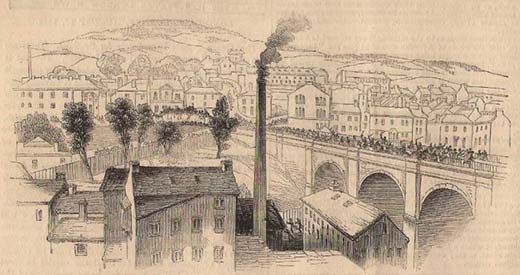Monday 30 September 2024
Hebden Bridge Local History Society Report
August 1842 – the people versus the establishment.
Speaker: David Glover
Thousands march on Halifax. Cotton mills brought to a standstill. These might have been the headlines in the turbulent summer of 1842, when discontented workers of the Calder Valley were determined to make their voices heard.

The scene at North Brige
David Glover is an experienced interpreter of Halifax's past and, speaking to Hebden Bridge Local History Society, he unravelled the complexities of what became known as the Great Strike or the Plug Riots. The plugs in question retained the water of the mill boilers, and the marching protesters had the bold idea of removing them so the steam powered machinery of the mills would be brought to a halt.
The political background was important: the workers had no democratic voice. Despite the protests of the Chartists, and millions of signatures demanding fairer representation, Parliament had twice rejected the People's Charter.
Growing industrialisation meant greater profits for the owners, but wages and conditions were poor. At the same time the punitive Poor Law Act of 1834 saw the growth of a harsh workhouse system. Radicalism had a strong base in Halifax, with renowned Chartist speakers like Ben Rushton, a handloom weaver from Ovenden, attracting huge crowds to outdoor rallies at Skircoat Moor.
On Monday 15th August, a rally was planned at Skircoat Moor. This should have been a working day, but hundreds of people were determined that they would not go to work. It is said that 12,000 men and women walked from Lancashire and Bradford, surging into Halifax, disabling the mills as they marched.
They crossed North Bridge to Haley Hill Mills, where the plug was successfully pulled with the co-operation of Edward Akroyd, the owner's son. Armed special constables were protecting Woodside, his father's mansion, and here several men were shot and injured. But with many mills successfully disabled, the protesting crowd must have felt they had achieved a kind of victory as they prepared for the following day.
Tuesday 16th August was another day without work, but with more confusion and violence. Eighteen people arrested at Skircoat Moor were transported to Wakefield Court by coach and train. The Hussars provided an armed escort, and crowds gathered, largely sympathetic to the prisoners. On the return journey, at Salterhebble, they attacked, injuring some soldiers.
At Northgate the reading of the Riot Act failed to disperse the protesters, and Hussars charged into the crowd with bayonets and sabres. More attacks took place on North Bridge and at Haley Hill where the infantry fired on the crowd causing serious injuries and several deaths.
Very little changed immediately as a result of the strike. When the People's Charter was again presented to Parliament in 1848 it was again rejected. But the events of the Great Strike and the mass revolt of workers endured in the history of Halifax. Ben Rushton was celebrated as a hero and more than 6000 mourners filled the streets of Halifax for his burial in Lister Lane Cemetery in 1853. The values and aspirations of the Chartists continue to be celebrated.
Hebden Bridge Local History Society meets from September until April on the second and fourth Wednesday of the month at Hebden Royd Methodist Church, starting at 7.30 pm. Details of the History Society talks programme, publications and of archive opening times are available on the "What's on" section of the HebWeb, on the History website and you can also follow the History Society Facebook page.
With thanks to Sheila Graham for this report
See previous reports in the HebWeb History section

